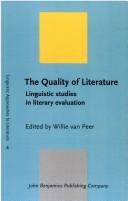| Listing 1 - 3 of 3 |
Sort by
|

ISBN: 1282152173 9786612152177 9027291519 9789027291516 9789027233363 9027233365 9781282152175 Year: 2008 Publisher: Amsterdam Philadelphia John Benjamins Pub.
Abstract | Keywords | Export | Availability | Bookmark
 Loading...
Loading...Choose an application
- Reference Manager
- EndNote
- RefWorks (Direct export to RefWorks)
Evaluation is central to literary studies and has led to an impressive list of publications on the status and history of the canon. Yet it is remarkable how little attention has been given to the role of textual properties in evaluative processes. Most of the chapters in The Quality of Literature redress this issue by dealing with texts or genres ranging from classical antiquity, via Renaissance to twentieth century. They provide a rich textual and historical panorama of how critical debate over literary quality has influenced our modes of thinking and feeling about literature, and how they continue to shape the current literary landscape. Four theoretical chapters reflect on the general state of literary evaluation while the introduction weaves the different threads together aiming at further conceptual clarification. This book thus contributes to a deeper understanding of the problems that are at the heart of past and present debates over literary quality.
Criticism. --- Literature --- Discourse analysis, Literary. --- Literary discourse analysis --- Rhetoric --- Literary style --- Appraisal of books --- Books --- Evaluation of literature --- Criticism --- Literary criticism --- Aesthetics --- History and criticism. --- Appraisal --- Evaluation --- Technique
Book
ISBN: 1847184219 9781847184214 Year: 2007 Publisher: Newcastle: Cambridge scholars,
Abstract | Keywords | Export | Availability | Bookmark
 Loading...
Loading...Choose an application
- Reference Manager
- EndNote
- RefWorks (Direct export to RefWorks)
Humanities --- Research --- Methodology. --- Statistical science --- Literature
Book
ISBN: 1280394412 9786613572332 9027274673 9789027274670 9027233489 9789027233486 9789027233479 9027233470 Year: 2012 Publisher: Amsterdam, Netherlands /Philadelphia, PA John Benjamins Pub.
Abstract | Keywords | Export | Availability | Bookmark
 Loading...
Loading...Choose an application
- Reference Manager
- EndNote
- RefWorks (Direct export to RefWorks)
This introductory textbook on empirical research methods for the Humanities reflects on the problems and possibilities of testing the empirical assumptions, explaining a wide range of methods from interviews to observation research. The book presents qualitative approaches to research but focuses mostly on quantitative methods, detailing the workings of basic statistics. Here is a much needed introductory textbook on empirical research methods for the Humanities. Especially aimed at students and scholars of Literature, Applied Linguistics, and Film and Media, it stimulates readers to reflect on the problems and possibilities of testing the empirical assumptions and offers hands-on learning opportunities to develop empirical studies. It explains a wide range of methods, from interviews to observation research, and guides readers through the choices researchers have to make. It discusses the essence of experiments, illustrates how studies are designed, how to de
Science and the humanities. --- Interdisciplinary approach to knowledge. --- Humanities --- Science --- Normal science --- Philosophy of science --- Knowledge, Theory of --- Methodology --- Science and the humanities --- Humanities and science --- Philosophy. --- Interdisciplinary approach to knowledge --- Humanities - Philosophy --- Science - Philosophy
| Listing 1 - 3 of 3 |
Sort by
|

 Search
Search Feedback
Feedback About UniCat
About UniCat  Help
Help News
News